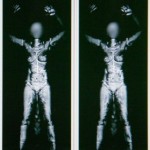Full-body scanners that caused outrage in Europe and America because they expose nakedness would soon be installed at the National Assembly to tighten security around lawmakers in the wake of recent incidents of bombings in the country.
Investigations by Daily Trust show that the management of the National Assembly has advertised contracts for procurement of the full-body scanners, which would be fixed at entrances to the buildings in the precincts of the legislature.
A full-body scanner is a device that creates an image of a person’s nude body through their clothing to look for hidden objects without physically removing their clothes or making physical contact.
The contracts would also cover provision of other new, sophisticated security gadgets, including baggage scanners, bomb detectors and electronic surveillance equipment to ensure more thorough checks of visitors and fortify the Assembly premises.
In public notices published in some national newspapers last week, the National Assembly management invited interested companies to enter bids for procurement of the full-body scanners and other items.
No amounts for the contracts were mentioned in the published notices, and a senior official at the National Assembly told Daily Trust that this is not unusual as potential bidders are expected to name their bid prices while the management has cap prices in mind. A full-body scanner costs about N27 million, according to checks by Daily Trust.
There was also no mention of the number of full-body scanners to be procured.
The main buildings in the National Assembly premises are the Senate building, the House of Representatives building, the ‚White House‘ housing the two chambers, and the Annex Office. Each of these buildings has more than one entrance, meaning many full body scanners would be required to cover all entrances.
Spokesman for the House of Representatives Zakari Mohammed (PDP, Kwara) confirmed the plans to buy the body scanners, and said it was aimed at improving physical examination of people entering the Assembly premises so as to forestall potential security breach.
„The existing scanners are not functional as confirmed by the Sergeant-At-Arms. As an institution we must put our security first because there are 360 members, each with five aides and there are hundreds of National Assembly staff you could imagine what will happen if anything happens,“ he told Daily Trust yesterday.
In Nigeria, such scanners are being used at the Murtala Mohammed International Airport, Lagos, and the Nnamdi Azikwe International Airport, Abuja.
The use of full-body scanners at airports in Europe and the United States caused outrage, because such equipment expose nakedness of travellers passing through them. The European Union recently banned X-ray body scanners in all European airports, „in order not to risk jeopardizing citizens‘ health and safety.“ X-ray body scanners emit enough radiation to theoretically damage DNA and cause cancer. Instead of X-ray scanners, European airports will use millimeter-wave scanners that utilize low-energy radio waves.
Asked about the morality and health concerns regarding full-body scanners, House spokesman Mohammed said the ones that would be deployed would consider people’s privacy. „The full body scanners are in different categories and the ones that will be installed won’t be injurious to people,“ he said.
Security at the National Assembly has been tight in recent times following the wave of Boko Haram attacks in parts of the country including Abuja. Visitors and staffers are subjected to thorough checks, while vehicles other than those owned by lawmakers are no longer allowed into the premises.
Full-body scanners were introduced after Farouk Abdul-Mutallab unsuccessfully attempted to detonate an explosive material hidden in his underwear over Detroit, United States, on Christmas Day in 2009.

